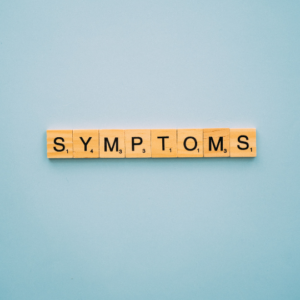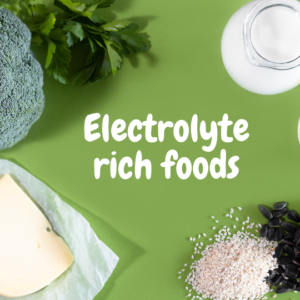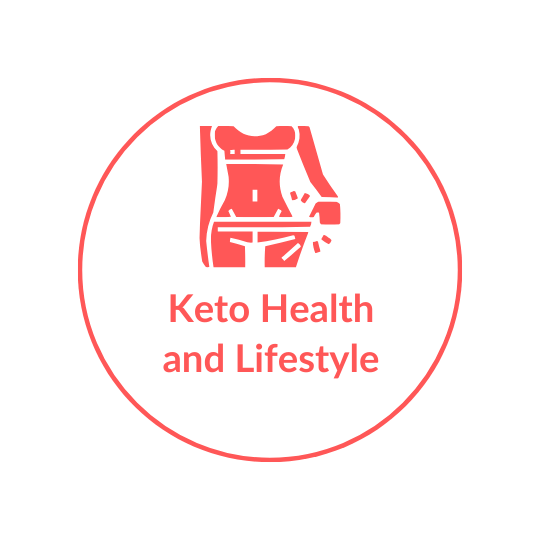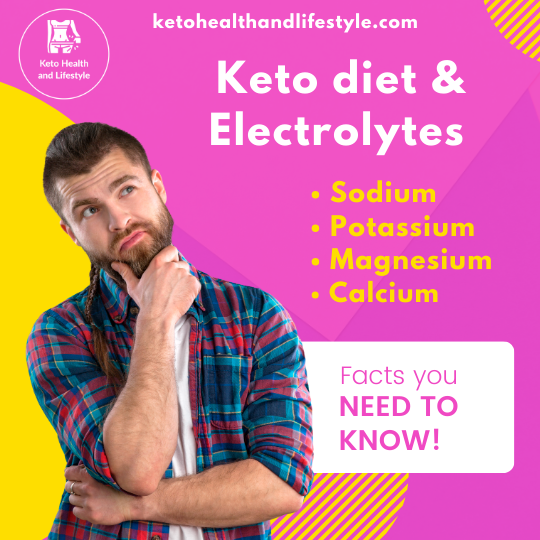This post may contain affiliate links which means I may receive a commission for purchases made through links. Learn more about policies on my about page.
So you’ve started your journey on the Keto Diet? Let’s talk about a vital but often overlooked element – keto diet and electrolytes. Electrolytes play a crucial role in maintaining balance within our bodies, especially while transitioning to a low-carb lifestyle like Keto.
When moving into the Keto Diet, ensuring you have the right balance of electrolytes becomes even more critical. The initial phases of Keto can sometimes lead to electrolyte imbalances, causing symptoms like fatigue, muscle cramps, or headaches. This is where understanding the significance of electrolytes becomes a game-changer.
If you haven’t started the Keto Diet yet check out the different variations of the Keto Diet to suit you: what-is-strict-clean-dirty-lazy-keto
Table of Contents
Why are electrolytes so essential on the Keto diet?
Electrolytes like sodium, potassium, and magnesium help regulate your body’s fluid balance, nerve function, and muscle contractions. Ignoring these key players could leave you feeling less than optimal as you adapt to your new eating habits.
As you go through your Keto journey, keep a close eye on your electrolyte levels. By incorporating electrolyte-rich foods or supplements into your daily routine, you can avoid the pitfalls of imbalance and set yourself up for success in the world of Keto. Let’s help you clarify about electrolytes and the Keto diet!
Understanding Keto diet and Electrolytes
Electrolytes are playing a crucial role in supporting our bodies, particularly when changing our food nutrition and diving into the realms of the Keto Diet. On this low-carb lifestyle, the significance of electrolytes like sodium, potassium, calcium and magnesium cannot be overstated. These elements are the backbone of maintaining our energy levels and overall health, ensuring we power through the day feeling our best.
Importance of Electrolytes on the Keto Diet
- Regulating Muscle Function: Electrolytes aid in maintaining proper muscle contractions, crucial for any physical activity you engage in.
- Balancing pH Levels: Ensuring your body’s pH levels are stable contributes to optimal bodily functions and metabolic processes.
- Controlling Nervous System: Electrolytes are essential for the smooth operation of your nervous system, supporting cognitive functions and communication between the brain and other body parts.
- Blood Pressure Regulation: Proper electrolyte levels help regulate blood pressure, promoting cardiovascular health and overall well-being.
How the Ketogenic diet can contribute to electrolyte imbalances
The ketogenic diet, while effective for weight loss, can contribute to electrolyte imbalances because a low-carb approach prompts the body to excrete more water and electrolytes like sodium, potassium, and magnesium through urine. Furthermore, the whole food keto diet, emphasising natural, unprocessed foods, tends to be lower in certain electrolytes compared to a standard diet. Failing to replenish these essential minerals can lead to symptoms like muscle cramps, fatigue, headaches, and constipation. Proper hydration and electrolyte supplementation are crucial for maintaining balance and avoiding potential complications while following a ketogenic lifestyle.
Low insulin levels have a diuretic effect, increasing urine output. Insulin plays a crucial role in regulating sodium and water reabsorption in the kidneys. When insulin levels drop, the kidneys’ ability to reabsorb sodium and water diminishes, leading to increased excretion via urine. This diuretic action helps maintain fluid balance and prevents excessive fluid retention in the body. However, prolonged low insulin levels, as seen in uncontrolled diabetes, can lead to dehydration and electrolyte imbalances if not managed properly.

Symptoms of Sodium Deficiency
- Muscle Cramps and Spasms: A lack of sodium can lead to an imbalance in the body’s electrolyte levels, which can cause involuntary muscle contractions or spasms, particularly in the legs, arms, and abdomen.
- Fatigue and Weakness: Sodium plays a crucial role in regulating fluid balance and nerve function. When sodium levels are low, the body may experience fatigue, lethargy, and a general feeling of weakness or lack of energy.
- Nausea and Vomiting: Severe sodium deficiency can lead to nausea and vomiting, as the body attempts to restore electrolyte balance.
- Dizziness and Headaches: Low sodium levels can cause a disruption in the body’s fluid balance, leading to dizziness, lightheadedness, and headaches.
- Confusion and Cognitive Impairment: Sodium is essential for proper brain function, and a deficiency can result in confusion, difficulty concentrating, and impaired cognitive abilities.
- Seizures (in severe cases): In extreme cases of sodium deficiency, the imbalance in electrolyte levels can lead to seizures or even coma.
- Low Blood Pressure: Sodium helps regulate blood pressure, and a deficiency can cause a drop in blood pressure, leading to symptoms such as dizziness, fainting, or even shock.
- Appetite Loss: Some individuals with sodium deficiency may experience a lack of appetite or a decreased desire to eat.
- Irregular Heartbeat: Sodium plays a role in regulating heart function, and a deficiency can lead to an irregular heartbeat or arrhythmia.
- Restless Leg Syndrome: Low sodium levels have been associated with an increased risk of developing restless leg syndrome, a condition characterized by an uncontrollable urge to move the legs, often accompanied by uncomfortable sensations.
Sodium deficiency is a common issue on the keto diet due to the diet’s emphasis on reducing carbohydrate intake. When carbohydrates are restricted, the body excretes more sodium through urine as insulin levels drop. This can lead to symptoms like headaches, fatigue, muscle cramps, and dizziness. To prevent sodium deficiency, it’s crucial for those on the keto diet to consume adequate amounts of sodium-rich foods like salted nuts, bouillon cubes, and electrolyte supplements. Monitoring sodium intake and adjusting accordingly can help maintain proper hydration and electrolyte balance.
Symptoms of Potassium Deficiency
- Muscle Weakness and Cramps: One of the most common symptoms of potassium deficiency is muscle weakness, which can manifest as fatigue, cramping, and twitching. This is because potassium plays a crucial role in muscle contraction and relaxation.
- Constipation and Bloating: Potassium is essential for proper bowel function. A deficiency can lead to constipation, bloating, and abdominal discomfort.
- Irregular Heartbeat (Arrhythmia): Potassium is vital for maintaining a normal heart rhythm. A severe deficiency can cause arrhythmias, palpitations, and an irregular heartbeat.
- Numbness and Tingling: Potassium plays a role in nerve function. A deficiency can cause numbness, tingling, and a pins-and-needles sensation, particularly in the extremities.
- Increased Blood Pressure: Potassium helps to regulate blood pressure by counterbalancing the effects of sodium. A deficiency can lead to elevated blood pressure and an increased risk of hypertension.
- Confusion and Mental Fogginess: Potassium is essential for proper brain function. A deficiency can cause confusion, difficulty concentrating, and mental fogginess.
- Excessive Thirst and Frequent Urination: Potassium plays a role in fluid balance. A deficiency can lead to excessive thirst, frequent urination, and dehydration.
- Muscle Cramps and Spasms: Potassium deficiency can cause muscle cramps and spasms, particularly in the legs, arms, and abdomen.
- Respiratory Difficulties: In severe cases, potassium deficiency can lead to respiratory problems, such as shortness of breath and difficulty breathing.
- Glucose Intolerance: Potassium is involved in insulin secretion and glucose metabolism. A deficiency can contribute to glucose intolerance and an increased risk of type 2 diabetes.
Symptoms of Magnesium Deficiency
- Muscle Cramps and Spasms: A lack of magnesium can lead to involuntary muscle contractions, resulting in painful cramps, particularly in the legs, feet, and hands. This is one of the most common signs of magnesium deficiency.
- Fatigue and Weakness: Magnesium plays a crucial role in energy production and muscle function. When levels are low, individuals may experience persistent fatigue, lethargy, and a general feeling of weakness.
- Sleep Disturbances: Magnesium is involved in regulating the sleep-wake cycle. Deficiency can disrupt sleep patterns, leading to insomnia, restless sleep, or frequent awakenings during the night.
- Anxiety and Irritability: Magnesium helps regulate neurotransmitters that influence mood and emotional well-being. Low levels of magnesium can contribute to increased feelings of anxiety, nervousness, and irritability.
- Irregular Heartbeat (Arrhythmia): Magnesium is essential for maintaining a normal heart rhythm. Deficiency can cause palpitations, irregular heartbeats, or other cardiac arrhythmias.
- Headaches and Migraines: Magnesium plays a role in regulating blood vessel constriction and neurotransmitter release. Inadequate levels may increase the frequency and severity of headaches, including migraines.
- Nausea and Vomiting: In severe cases of magnesium deficiency, individuals may experience nausea, vomiting, and loss of appetite.
- Numbness and Tingling: Low magnesium levels can interfere with nerve function, leading to numbness, tingling, or a “pins and needles” sensation, particularly in the extremities.
- Osteoporosis Risk: Magnesium is essential for maintaining strong bones and preventing osteoporosis. Deficiency can contribute to decreased bone mineral density and an increased risk of fractures.
- Constipation: Magnesium plays a role in regulating muscle contractions in the digestive tract. Deficiency can lead to constipation and other digestive issues.
Symptoms of Calcium Deficiency
- Muscle Cramps and Spasms: Calcium plays a vital role in muscle contraction and relaxation. A deficiency can lead to painful muscle cramps, particularly in the legs, feet, and abdomen.
- Numbness and Tingling: Low calcium levels can disrupt nerve function, causing a pins-and-needles sensation or numbness in the extremities, such as the hands, feet, and around the mouth.
- Brittle Nails: Calcium is essential for maintaining healthy nails. A deficiency can result in brittle, thin, and easily breakable nails.
- Fatigue and Lethargy: Calcium is involved in energy production and metabolism. Insufficient levels can lead to persistent feelings of fatigue, weakness, and lack of energy.
- Poor Appetite: Calcium deficiency can negatively impact appetite, leading to decreased food intake and potential weight loss.
- Irregular Heartbeat (Arrhythmia): Calcium plays a crucial role in regulating heart muscle contractions. Imbalances can cause irregular or abnormal heart rhythms.
- Osteoporosis: Chronic calcium deficiency can weaken bones, increasing the risk of osteoporosis, a condition characterized by low bone density and an increased susceptibility to fractures.
- Dental Issues: Calcium is essential for maintaining strong teeth. A deficiency can lead to tooth decay, gum disease, and an increased risk of tooth loss.
- Colon Cancer Risk: Some studies have suggested a potential link between calcium deficiency and an increased risk of colon cancer, although more research is needed to establish a definitive connection.
- Mental Disturbances: In severe cases, calcium deficiency can contribute to mental disturbances such as confusion, irritability, anxiety, and depression.
You can see that many of the symptoms cross over between electrolytes.
Learn more about tests for electrolytes on the Keto Diet here.
Getting Sufficient Electrolytes on the Keto Diet
When embarking on the Keto Diet journey, ensuring adequate electrolyte intake is crucial to support overall well-being and mitigate the risk of electrolyte imbalance. Let’s delve into two key aspects of getting sufficient electrolytes on the Keto Diet: incorporating electrolyte-rich foods and considering supplementation when needed.
Electrolyte Rich Foods for Keto

Sodium-Rich Foods
- Cured Meats: Bacon, salami, prosciutto, and other cured meats are excellent sources of sodium.
- Bouillon Cubes or Broth: Dissolve a low-carb bouillon cube in hot water or opt for bone broth for a sodium boost.
- Pickled Foods: Pickles, olives, and other pickled vegetables are naturally high in sodium due to the brining process.
- Cheese: Many varieties of cheese, particularly aged cheeses like Parmesan and cheddar, are rich in sodium.
Potassium Rich Foods
- Avocados: These creamy fruits are packed with potassium and healthy fats, making them a keto-friendly choice.
- Leafy Greens: Spinach, kale, and Swiss chard are excellent sources of potassium and other essential nutrients.
- Mushrooms: Varieties like crimini, portobello, and shiitake mushrooms are rich in potassium.
- Nuts and Seeds: Almonds, pumpkin seeds, and Brazil nuts are keto-friendly and potassium-dense.
Magnesium Rich Foods
- Fatty Fish: Salmon, mackerel, and sardines are not only high in healthy omega-3 fatty acids but also contain substantial amounts of magnesium.
- Nuts and Seeds: Almonds, cashews, pumpkin seeds, and chia seeds are excellent sources of magnesium.
- Dark Chocolate: While it should be consumed in moderation, dark chocolate (at least 70% cocoa) is a delicious way to boost your magnesium intake.
- Avocados: In addition to being potassium-rich, avocados are also a good source of magnesium.
| Electrolyte | Amount per day |
| Sodium | 1500mg |
| Potassium | 4700mg |
| Magnesium | 420mg |
| Calcium | 1000mg |
Electrolyte supplements Keto
While prioritising electrolyte-rich foods is key, some individuals may find it challenging to meet their electrolyte requirements solely through diet. In such cases, electrolyte supplementation can be considered under the guidance of a healthcare provider.
Consulting a healthcare professional before incorporating electrolyte supplements is essential to ensure that the supplementation aligns with individual needs and prevents any potential imbalances. Remember, balance is key when it comes to electrolytes on the Keto Diet for a smooth and successful transition.
In essence, by combining a variety of electrolyte-rich foods and considering supplementation when necessary, you can effectively maintain electrolyte balance and support your well-being on the Keto Diet journey. Remember, always listen to your body and adjust your electrolyte intake accordingly to thrive on your ketogenic lifestyle.
Preventing Electrolyte Imbalance on the Keto Diet
Electrolytes and hydration go hand in hand when on the Keto Diet. Electrolytes are minerals that carry an electrical charge and play a crucial role in various bodily functions. When following a Keto Diet, which is known for its low-carb nature, the body can easily lose electrolytes through increased urination, leading to an imbalance. Proper hydration is key to maintaining optimal electrolyte levels as water is essential for the transportation of electrolytes throughout the body.
Hydration and Electrolytes
Hydration is vital for supporting electrolyte balance, especially on a Keto Diet. Water acts as a carrier for electrolytes, aiding in their distribution and ensuring they reach the cells that need them. Without adequate hydration, the body may struggle to regulate electrolyte levels, potentially leading to imbalances. To support electrolyte function, it’s important to drink water regularly throughout the day and especially when engaging in physical activities or during hot weather.
Familiarise yourself with water, drinks and hydration on the Keto Diet here.
Monitoring and Adjusting Electrolytes
To prevent electrolyte imbalances on the Keto Diet, it’s essential to monitor your electrolyte levels regularly. Signs of an electrolyte imbalance include muscle cramps, fatigue, and irregular heart rhythms. One way to monitor electrolytes is through blood tests that can provide insights into your sodium, potassium, and magnesium levels. Based on the results, you can adjust your electrolyte intake through dietary changes or supplements. Consulting a healthcare provider for guidance on monitoring and adjusting electrolytes is recommended to ensure you maintain a healthy balance while on the Keto Diet.
For more information on the importance of electrolytes on the Keto Diet and how to prevent imbalances, check out How To Get Enough Electrolytes On Keto and Benefits of electrolytes on a keto diet – how to avoid electrolyte imbalances.
Incorporating electrolyte-rich foods and proper hydration practices into your Keto journey can help you maintain balance and support your overall well-being. Remember, staying hydrated and keeping an eye on your electrolyte levels are key elements in thriving on the Keto Diet.
Tracking electrolytes
Tracking electrolyte intake is crucial for maintaining optimal hydration levels and supporting various bodily functions. Electrolytes play vital roles in regulating fluid balance, muscle contractions, and nerve transmission. Monitoring electrolyte consumption becomes especially important during periods of increased sweat loss, such as intense exercise or exposure to hot environments. Keeping a detailed log of foods and beverages consumed, along with their electrolyte content, can help individuals identify potential deficiencies or excesses, enabling them to adjust their dietary intake accordingly. This proactive approach ensures the body receives the necessary electrolytes for peak performance and overall well-being.
Consider using tools such as Carb Manager. This comprehensive platform not only helps in monitoring carbohydrates but also provides detailed information about the electrolyte content in various foods and beverages. This can be an invaluable asset in maintaining the optimal balance of electrolytes for both everyday wellness and intense physical activity.
Keto flu and electrolyte imbalances
When starting a ketogenic diet, many individuals experience what’s known as the “keto flu” – a constellation of symptoms like fatigue, headaches, brain fog, and nausea. This temporary discomfort stems from an electrolyte imbalance caused by the body’s increased excretion of water and minerals as it shifts from burning glucose to fat for fuel. Sodium, potassium, and magnesium levels can plummet, leading to dehydration, muscle cramps, and other issues. Proactively replenishing these vital electrolytes through diet and supplementation is crucial for mitigating the keto flu and ensuring a smooth transition into ketosis.
Key takeaway:
So to sum it all up, when embarking on the Keto Diet, ensuring a proper balance of electrolytes is key to feeling your best. Remember, electrolytes such as sodium, magnesium, and potassium play a crucial role in maintaining hydration, muscle function, and overall well-being. Incorporating electrolyte-rich foods like dark chocolate, avocado, and leafy greens can help you stay on track with your keto journey. Don’t overlook the importance of electrolytes – they’re your secret weapon to thriving on the Keto Diet. So keep those electrolytes in check and power through your keto adventure like a pro!
Electrolytes and Keto diet FAQ

What is the best electrolyte supplement for Keto?
Personally I have continually been using 2 brands of electrolytes on my Keto diet lifestyle with good results.
MyProtein and NuUNutrition make great affordable electrolytes to supplement your journey. Both have a great daily amount of sodium, magnesium and potassium.
How much water should I drink on keto, and how does it affect electrolytes?
Increasing your water intake is important on a ketogenic diet, but it’s also essential to balance water intake with electrolytes. Drink enough water to stay hydrated—aim for at least 8 cups (about 2 litres) per day, but this can vary based on activity level and individual needs. Be mindful that drinking excessive amounts of water without replenishing electrolytes can lead to dilution of electrolytes in your body, worsening the imbalance.
Can electrolyte imbalances on keto be dangerous?
While mild electrolyte imbalances are common and can be easily addressed, severe imbalances can be dangerous. Significant deficits in potassium and magnesium, for instance, can lead to heart rhythm disturbances, while extreme sodium imbalances can cause neurological issues. It’s vital to monitor your electrolyte intake and consult with a healthcare professional if you have any concerns.
What are the recommended daily amounts of electrolytes on keto?
For individuals following a well-formulated ketogenic diet, the recommended daily intake is 1500mg of sodium and 4700mg of potassium. Magnesium requirements generally range from 420mg (men) 320mg (women) per day. However, these needs may vary based on individual factors such as activity level, age, and health status, so it’s important to tailor these recommendations to your specific needs.
Why do you lose more electrolytes like sodium and potassium on the ketogenic diet?
When following a ketogenic diet, you tend to lose more electrolytes, specifically potassium and sodium, due to the diuretic effect caused by the increased excretion of ketones. Ketosis prompts the kidneys to expel more fluids, along with essential minerals like potassium and sodium. Additionally, the restriction of carbohydrates, which are responsible for retaining water in the body, further contributes to this electrolyte depletion. Consequently, it’s crucial to actively replenish these vital electrolytes through dietary sources or supplementation to maintain proper hydration and prevent potential adverse effects.
- What Are Exogenous Ketones? A Straightforward Guide for Keto and Training
- Affordable Keto Supplements Online UK, What I Buy (2026)
- Keto Wine: Best Zero Carb Wines 2026 Guide for Low-Carb Living
- Keto Crunch Cereal: Is Catalina Crunch Keto Friendly? Nutrition Facts & Review 2026
- Is Dragon Fruit Keto Friendly? Carbs & Keto Guide for 2026 Fitness and Diet Success

